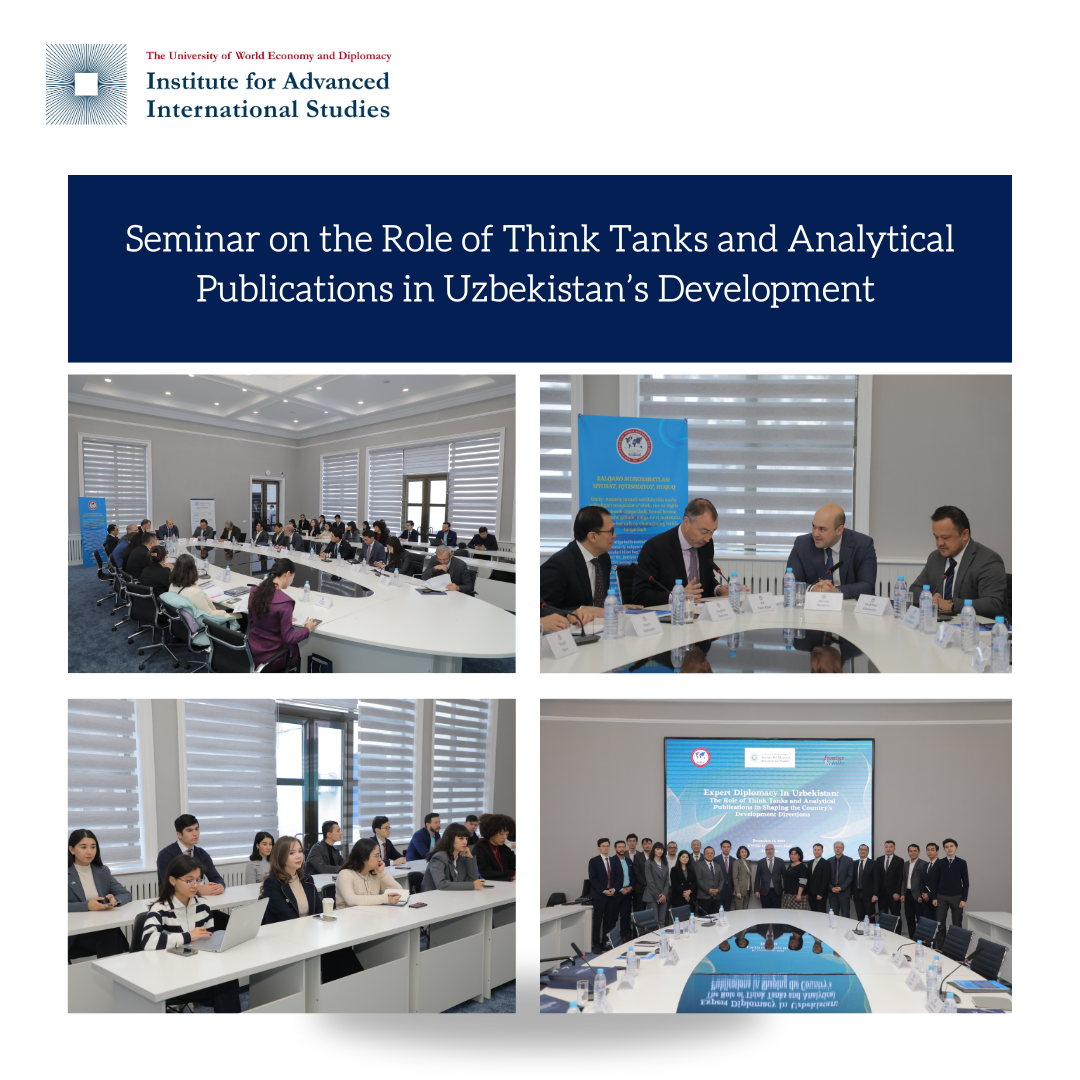
On December 18, the University of World Economy and Diplomacy (UWED) hosted a landmark seminar titled “Expert Diplomacy in Uzbekistan: The Role of Think Tanks and Analytical Publications in Shaping the Country’s Development Directions”. Jointly organised by the Institute for Advanced International Studies (IAIS) and the editorial board of “International Relations” Journal, the event provided a platform for Uzbekistan’s leading experts and academics to explore how think tanks and analytical publications shape national and international policy.
The seminar commenced with welcoming remarks by Akram Umarov, First Vice-Rector for Academic Affairs at UWED. He emphasized the growing significance of expert diplomacy in Uzbekistan’s strategic development, highlighting how think tanks and research publications contribute to informed policymaking and support the nation’s diplomatic efforts on the global stage. His remarks set the tone for the discussions, which aimed to bridge gaps between the expert community and decision-makers.
The first panel, “Think Tanks as Tools for Shaping Uzbekistan’s Development Vectors”, moderated by Shakhboz Akhmedov, Deputy Director of IAIS, who introduced the session by discussing how think tanks serve as vital instruments for policy design and implementation, particularly in addressing pressing national and regional challenges.
Sharif Akhmedov, Senior Research Fellow at the Institute for Strategic and Regional Studies (ISRS), opened the panel with a presentation on the strategic role ISRS plays in shaping Uzbekistan’s policies, focusing on the need for comprehensive threat assessments and proposing actionable recommendations for national and regional stability. This was followed by Shakhodat Khashimova, Senior Research Fellow at the Centre for Foreign Policy Studies and International Initiatives, who delved into innovative approaches in diplomacy facilitated by think tanks, underscoring the importance of using data-driven models to enhance Uzbekistan’s engagement in regional cooperation and multilateral platforms. Continuing the discussion, Ozod Tanbaev, Leading Research Fellow at the International Institute for Central Asia, addressed challenges faced by think tanks in Uzbekistan. Complementing this, Farrukh Khakimov, Head of the Department at the Centre for Development Strategy, elaborated on the practical mechanisms by which think tanks support the government in achieving development goals. The panel concluded with Ulugbek Ishankhodjaev, Head of the Centre for American Studies at IAIS, who provided a nuanced perspective on analytical traditions in Uzbekistan, underlining the importance of broadening research areas, and emphasized the critical role of think tanks in framing policies that align national interests with global trends.
Ulugbek Khasanov, Editor-in-Chief of “International Relations” Journal moderated the second panel on “The Role of Analytical Publications in Shaping Public Opinion and Foreign Policy”. In his introduction, he highlighted the transformative power of analytical publications in shaping public discourse and influencing decision-makers.
Bekzod Zakirov, Director of the Centre for Policy Research and Outreach at Westminster International University, opened the session by exploring how policy research publications serve as bridges between academic findings and actionable policies, proposing innovative strategies to enhance the accessibility and impact of such publications among policymakers. Following this, Gavkhar Sultanova, Associate Professor at UWED, discussed the role of analytical publications in advancing Uzbekistan’s economic diplomacy. She emphasized the importance of economic analyses in trade negotiations and their potential to attract foreign investment. Adding to this perspective, Muzaffar Munavvarov, Associate Professor at UWED, examined how strategic publications shape public understanding and support for foreign policy initiatives. Drawing on examples, he illustrated how well-crafted articles can align public opinion with national interests. Rounding off the panel, Gulnora Raimova, Head of Department at UWED, shed light on the importance of research-driven publications in fostering sustainable development. She emphasized aligning scientific research with national development strategies to ensure relevance and impact.
This seminar not only provided a space for robust intellectual exchange but also reinforced the vital role of think tanks and analytical publications in advancing Uzbekistan’s global and domestic policy priorities. The event marked a significant step in fostering cooperation between academics, policymakers, and government bodies.